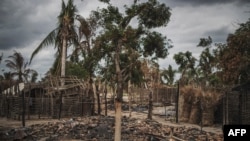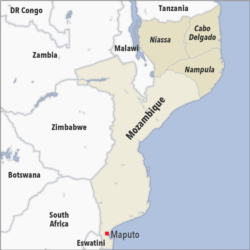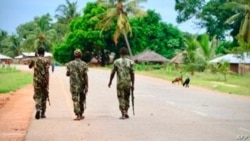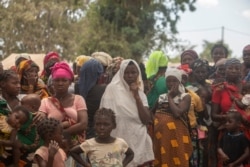The shadowy, violent Islamist insurgency in Mozambique's northern Cabo Delgado region has confounded authorities, residents, aid groups and observers — and appears to be continuing unabated.
By any account, Mozambique's northern region is in bad shape. An insurgency that started in 2017 in Cabo Delgado province set off a domino effect that toppled fragile institutions and then bled into the neighboring provinces of Niassa and Nampula.
Today, the United Nations estimates that 1.3 million people urgently need humanitarian assistance in the area. Nearly 950,000 people are dealing with severe hunger. In 2020, nearly 580,000 people were forced to flee their homes amid violence that saw insurgents killing high-ranking members of the national security forces. The violence has destroyed livelihoods, disrupted markets and driven up prices of essential goods. Cholera is on the rise, and the violence has destroyed 36 percent of the area's health facilities.
So how did we get here? Carlton Cadeado, a security researcher at Maputo's Joaquim Chissano University, says the first mistake, back in 2017, was the government's.
"The government underestimated the threat, and this underestimation of the threat was also associated with the lack of knowledge of what was going on the ground," he told journalists Wednesday. "The government did not have the logistics and the capacity to deal with the problem. That's why I cannot hesitate to say that there was a failure in dealing with the problem in the first instance."
Which, says journalist Tom Bowker, is a surprising oversight. Bowker, founder and editor of Mozambique-focused website Zitamar News, was expelled from Mozambique last week and banned for 10 years. It's partly, he thinks, because of his website's reporting on the conflict in this gas-rich region, where seasonal hunger and poverty are rife.
But, he said, the region has always been problematic — the only change is that now the world knows about it. He spoke to journalists from France, where he has relocated with his two young children and his wife, who is a writer and a journalist for the site.
"Life up there's always been hard, and I think it's been a fertile province for an insurgency to happen," he said. "And it does have an Islamist element to it, but it's definitely fueled by the fact that people are dissatisfied with the hand they've got in life, and with the trajectory of Mozambique and Cabo Delgado since independence as well, when things have not worked out as people would have hoped. And the advent of the LNG (liquified national gas) projects in the province as well, is only going to add to that feeling of inequality and people missing out on riches."
Alex Vines, director of the Africa program at research group Chatham House, says there is no one cause of this conflict, which makes it harder to solve.
"So organized crime, poor governance, inequality, all of these things play in, as well as poor periphery politics," he said. "…. And so there are echoes of what we've seen in the Sahel and other places of poor periphery politics. Having said that, the big difference, and the one that I still struggle with, is that the president and some of the elite around him come from Cabo Delgado. This is their backyard. So that's different from Kidal in Mali and some of the other places that we're talking about that would be peripheries."
Jasmine Opperman, Africa analyst at Armed Conflict Location and Event Data Project, says the lack of knowledge is a major problem.
"No one can state, or know, what is happening in Cabo Delgado as a hardcore fact," she said. "That we do not simply know what is going to happen, and we can come up with scenarios and we can come up with a hypothesis, but what is clear is that the insurgents have gained a lot of advantage."
Opperman said that it's encouraging that Mozambique's military has stepped in, taking much of the security burden off local police, but this conflict will take time to resolve. How much time? Again, as with many things in this shadowy region, no one can say for sure.















